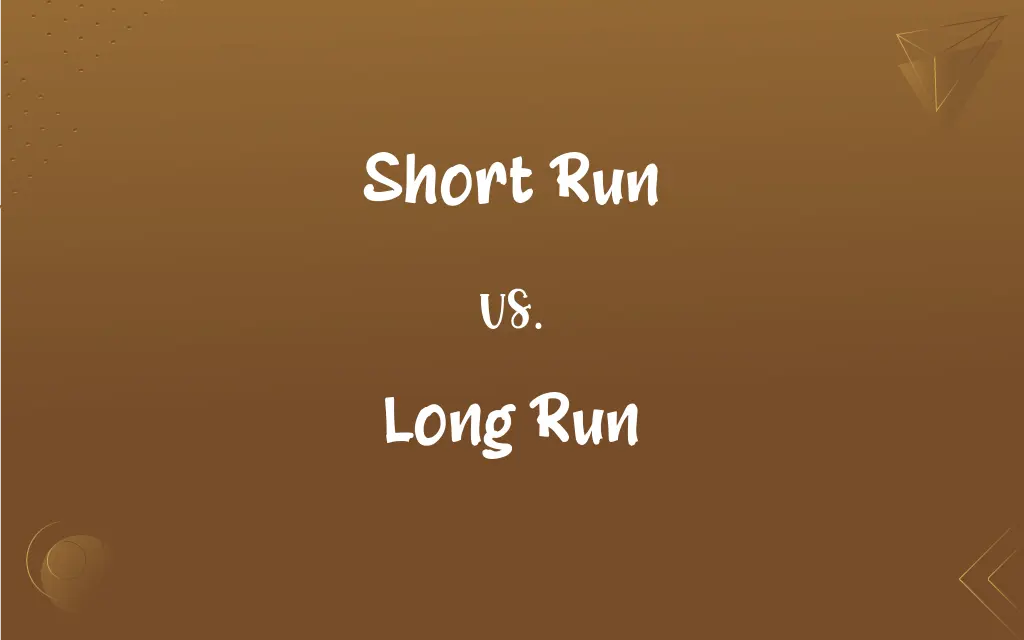Short Run vs. Long Run: What's the Difference?
Edited by Aimie Carlson || By Harlon Moss || Published on December 14, 2023
"Short run refers to a period where some factors are fixed, while the long run is a period where all factors are variable."

Key Differences
In economics, the short run is a time frame where some inputs or factors of production are fixed, typically capital and technology. Conversely, the long run is a period where all inputs, including capital and technology, can be adjusted.
The short run is characterized by limitations in changing production levels, as some factors cannot be immediately altered. The long run, on the other hand, offers flexibility as all inputs, including infrastructure and workforce, can be changed.
Decision-making differs between these periods; in the short run, companies focus on maximizing output with existing resources. In the long run, strategic decisions, such as expansion or reduction of operations, are considered as all resources are adjustable.
The short run is crucial for immediate operational decisions, while the long run is vital for long-term planning and investment. Costs behave differently too, with variable and fixed costs in the short run and all costs becoming variable in the long run.
The short run emphasizes immediate constraints and efficiencies, while the long run allows for comprehensive strategic planning and resource allocation, considering the potential for all factors to change.
ADVERTISEMENT
Comparison Chart
Flexibility
Limited, due to fixed factors
High, as all factors are variable
Cost Consideration
Fixed and variable costs
All costs are variable
Planning Focus
Immediate operational efficiency
Strategic planning and long-term growth
Resource Adjustment
Limited adjustments to workforce and output
Full adjustment of capital, labor, technology
Decision-Making
Focus on short-term goals and profitability
Long-term decisions, including expansion
ADVERTISEMENT
Short Run and Long Run Definitions
Short Run
Short run signifies a phase where strategic changes are limited.
In the short run, the firm focused on using its current workforce efficiently.
Long Run
Long run refers to a timeframe allowing complete operational flexibility.
The long run strategy included diversifying the product line.
Short Run
Short run is a period where at least one input is fixed.
In the short run, the company cannot expand its factory size.
Long Run
Long run is an economic term indicating no fixed factors.
In the long run, the business can adjust its workforce size as needed.
Short Run
Short run is an economic term denoting a period of inflexible factors.
Businesses often make do with existing resources in the short run.
Long Run
Long run is a period where all factors of production are variable.
In the long run, the company plans to open new branches.
Short Run
Short run refers to a timeframe with immediate operational constraints.
The short run challenges included maximizing production with limited machinery.
Long Run
Long run signifies a phase of strategic and comprehensive planning.
The long run objectives involve significant technology upgrades.
Short Run
Short run is a concept where certain resources remain unchanged.
The short run production capacity was restricted by the current technology.
Long Run
Long run is a concept where adjustments to all resources are possible.
In the long run, the company might relocate to a larger facility.
Short Run
Relating to or extending over a limited period;
Short-run planning
A short-term lease
Short-term credit
Long Run
Relating to or extending over a relatively long time; as, the long-run significance of the elections.
Long Run
Relating to or extending over a relatively long time;
The long-run significance of the elections
The long-term reconstruction of countries damaged by the war
A long-term investment
FAQs
Are all costs variable in the long run?
Yes, in the long run, all costs, including fixed costs, become variable.
What is the short run in economics?
It's a period where some inputs, like capital, are fixed and can't be changed.
What defines the long run in economic terms?
It's a timeframe where all factors, including capital and technology, are variable.
How does decision-making differ in these periods?
Short run decisions focus on immediate efficiency, long run on strategic planning.
Can technology be changed in the short run?
Generally, technology is a fixed input in the short run and can't be easily changed.
What are long run decisions in business?
They include strategic choices like expansion, diversification, and technology upgrades.
Is resource allocation flexible in the short run?
No, it's constrained due to fixed factors like existing machinery and capital.
Can a company expand in the short run?
Expansion is limited in the short run due to fixed factors like factory size.
How do costs behave differently in these periods?
In the short run, there are fixed and variable costs; in the long run, all costs are variable.
How does the long run affect market entry?
In the long run, new firms can enter the market as there are no fixed constraints.
Is it easier to adapt to market changes in the long run?
Yes, the long run offers flexibility to adapt to market changes through variable inputs.
Can firms avoid sunk costs in the short run?
No, sunk costs are often unavoidable in the short run due to fixed investments.
Is workforce adjustment easier in the long run?
Yes, in the long run, companies can fully adjust their workforce and other inputs.
What is a short run production function?
It's a function showing the maximum output achievable with fixed and variable inputs.
Can a firm change its scale of operations in the short run?
Scale changes are limited in the short run due to fixed capital and technology.
What is long run equilibrium?
It's a state where all firms in the market are making normal profits, with no incentive to enter or exit.
What role does technology play in the long run?
In the long run, firms can adopt new technologies, enhancing efficiency and productivity.
Does the short run affect pricing strategies?
Yes, firms might focus on covering variable costs in the short run, affecting pricing.
How does consumer demand affect the long run?
Long-term planning considers changes in consumer demand to adjust production and strategy.
Is it possible to reduce fixed costs in the short run?
Fixed costs generally remain constant in the short run and can't be easily reduced.
About Author
Written by
Harlon MossHarlon is a seasoned quality moderator and accomplished content writer for Difference Wiki. An alumnus of the prestigious University of California, he earned his degree in Computer Science. Leveraging his academic background, Harlon brings a meticulous and informed perspective to his work, ensuring content accuracy and excellence.
Edited by
Aimie CarlsonAimie Carlson, holding a master's degree in English literature, is a fervent English language enthusiast. She lends her writing talents to Difference Wiki, a prominent website that specializes in comparisons, offering readers insightful analyses that both captivate and inform.







































































